
From the Website of THE GUARDIAN NEWS
links: https://www.theguardian.com/world/2021/feb/02/myanmar-coup-who-are-the-military-figures-running-the-country
Myanmar coup: who are the military figures running the country?
Army stalwarts take over Myanmar leadership after coup that removed Aung San Suu Kyi and her allies from government
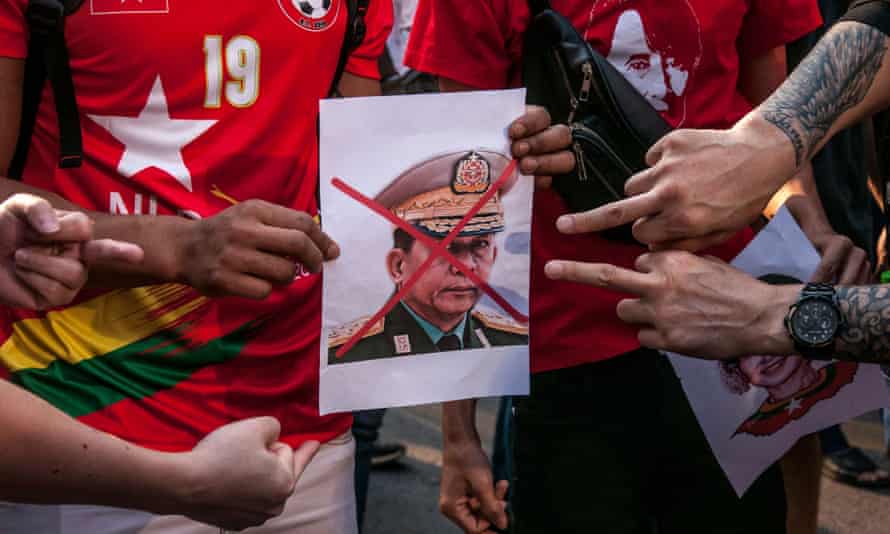 NLD supporters hold a crossed-out portrait of Myanmar’s army chief Min Aung Hlaing after Monday’s coup.
NLD supporters hold a crossed-out portrait of Myanmar’s army chief Min Aung Hlaing after Monday’s coup.
The Myanmar military has appointed some familiar faces to key government posts after the coup that ousted the civilian government.
Military ruler: General Min Aung Hlaing, armed forces chief
Gen Min Aung Hlaing, 64, initiated the coup on Monday and has since been appointed Myanmar’s leader for the next year. He has been a prominent figure in the armed forces for almost a decade. He studied law before entering military service in the 1970s and steadily rose through the ranks to become the commander-in-chief in 2011.
After the junta was dissolved in 2011, he served in Myanmar’s first quasi-civilian government and was in line to be president. However, the historic 2015 election victory for the National League for Democracy (NLD) brought Aung San Suu Kyi to power instead.
Myanmar coup: who are the military figures running the country?
Army stalwarts take over Myanmar leadership after coup that removed Aung San Suu Kyi and her allies from government

The Myanmar military has appointed some familiar faces to key government posts after the coup that ousted the civilian government.
Military ruler: General Min Aung Hlaing, armed forces chief
Gen Min Aung Hlaing, 64, initiated the coup on Monday and has since been appointed Myanmar’s leader for the next year. He has been a prominent figure in the armed forces for almost a decade. He studied law before entering military service in the 1970s and steadily rose through the ranks to become the commander-in-chief in 2011.
After the junta was dissolved in 2011, he served in Myanmar’s first quasi-civilian government and was in line to be president. However, the historic 2015 election victory for the National League for Democracy (NLD) brought Aung San Suu Kyi to power instead.
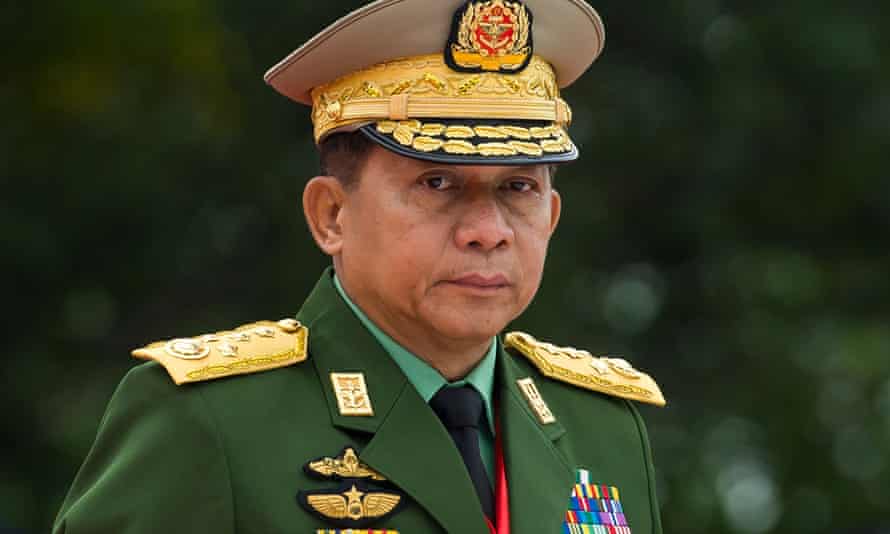
Gen Min Aung Hlaing will lead Myanmar for the next year. Photograph: Ye Aung Thu/AFP/Getty
With Aung Sang Suu Kyi as the de facto head of state, Min Aung Hlaing appeared to become more publicly involved in politics. According to Radio Free Asia, he amassed hundreds of thousands of followers on social media, but his accounts were removed from Facebook and Twitter after the army’s persecution of Rohingya Muslims.
In 2017, more than 750,000 Rohingya were forced to flee to neighbouring Bangladesh. United Nations investigators said Myanmar’s operation included mass killings, gang-rapes and widespread arson and was executed with “genocidal intent”. In 2019, the US imposed sanctions on him and three other military officers. The US Treasury also froze his US-based assets and banned doing business with him and three other Myanmar military leaders.
In July 2020, Britain also imposed sanctions on Min Aung Hlaing, accusing him and his deputy army commander, Soe Win, of orchestrating systematic violence against the Rohingya.
Min Aung Hlaing was famously uncooperative with the civilian government and was said to be particularly resentful of Aung San Suu Kyi’s continued popularity. According to advisers, the pair had not spoken for at least a year. Tensions reportedly rose further after November’s election defeat in which the military-backed Union Solidarity and Development party (USDP) was humiliated. Prior to the election, Min Aung Hlaing made his own political ambitions known and was reported to be working closely with the USDP in an apparent move to became president. However, the landslide win for Aung San Suu Kyi’s party swiftly crushed those ambitions.
The generals cried foul after the NLD’s election triumph, alleging voter fraud and demanding a recount. Min Aung Hlang will reach mandatory retirement age in July, prompting some to speculate the coup was a way of him staying in office. He and his family have reportedly amassed considerable wealth.
President: Myint Swe
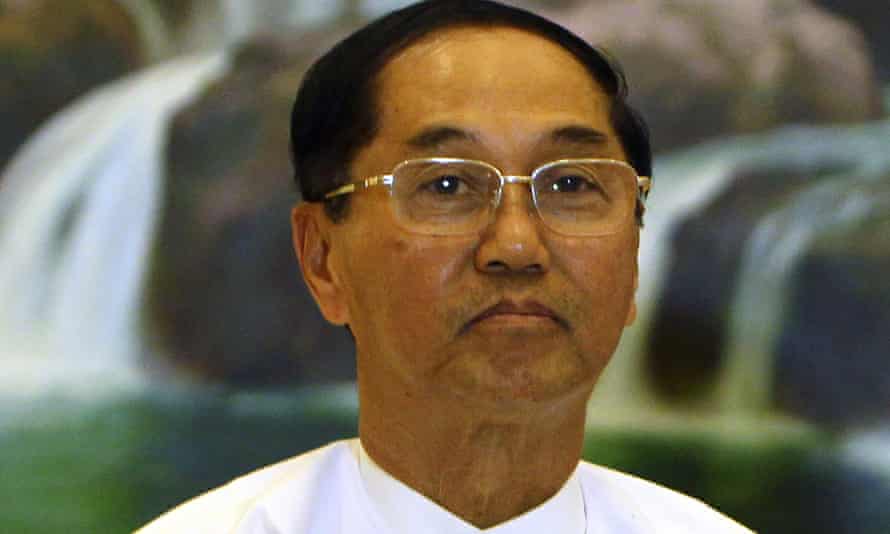
Myint Swe was elevated from vice-president to president in the coup. Photograph: Aung Shine Oo/AP
Myint Swe was the army-appointed vice-president when he was named on Monday to take over after the military arrested the civilian leader, Aung San Suu Kyi, and other leaders of her party.
Immediately after he was named president, Myint Swe, 69, handed power to the country’s top military commander, Min Aung Hlaing. Under Myanmar’s 2008 constitution, the president can hand power to the military commander in cases of emergency.
Myint Swe is a close ally of the former military leader Than Shwe, who stepped down to allow the transition to a quasi-civilian government beginning in 2011. That transition eventually allowed Myanmar to escape the international sanctions that had isolated the regime for years, hindering foreign investment.
Though he has not had a very high international profile, Myint Swe has played a key role in the military and in politics. He is a former chief minister of Yangon, Myanmar’s biggest city, and for years headed its regional military command. During the 2007 monk-led popular protests known internationally as the saffron revolution, he took charge of restoring order in Yangon after weeks of unrest in a crackdown that killed dozens of people. Hundreds were arrested.
Myint Swe was the army-appointed vice-president when he was named on Monday to take over after the military arrested the civilian leader, Aung San Suu Kyi, and other leaders of her party.
Immediately after he was named president, Myint Swe, 69, handed power to the country’s top military commander, Min Aung Hlaing. Under Myanmar’s 2008 constitution, the president can hand power to the military commander in cases of emergency.
Myint Swe is a close ally of the former military leader Than Shwe, who stepped down to allow the transition to a quasi-civilian government beginning in 2011. That transition eventually allowed Myanmar to escape the international sanctions that had isolated the regime for years, hindering foreign investment.
Though he has not had a very high international profile, Myint Swe has played a key role in the military and in politics. He is a former chief minister of Yangon, Myanmar’s biggest city, and for years headed its regional military command. During the 2007 monk-led popular protests known internationally as the saffron revolution, he took charge of restoring order in Yangon after weeks of unrest in a crackdown that killed dozens of people. Hundreds were arrested.
Home affairs minister: Lt Gen Soe Htut
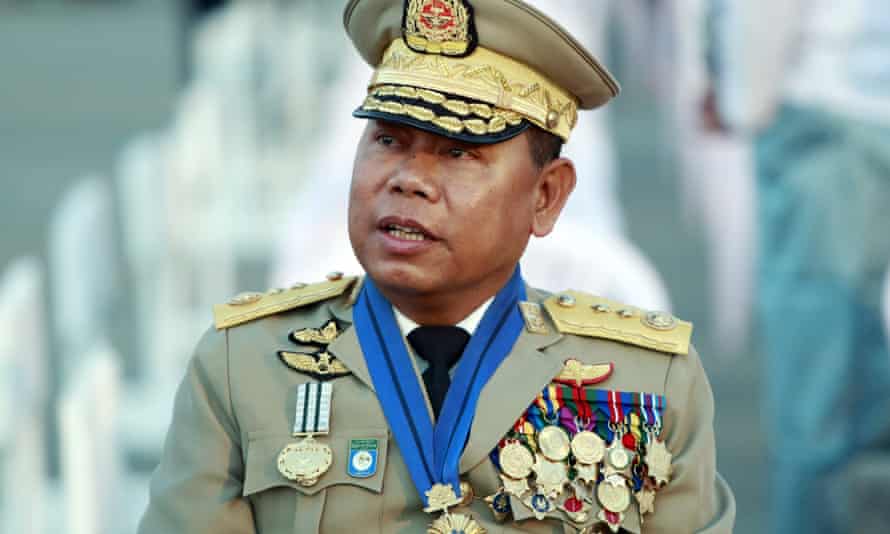
Myanmar has appointed Lt Gen Soe Htut as home affairs minister. Photograph: Aung Shine Oo/AP
Lt Gen Soe Htut, 60, is a career soldier and was head of Myanmar’s military intelligence before being appointed to head the home affairs ministry in March 2020, a position he retained on Monday. The ministry oversees police, prisons and intelligence. Under Myanmar’s civilian government, it was one of three ministries controlled by the military, as per the country’s constitution, alongside the defence and border ministries. According to Human Rights Watch, Soe Htut was previously on the EU sanctions list for human rights abuses related to his role leading the military’s southern command.
Defence minister: Gen Mya Tun Oo
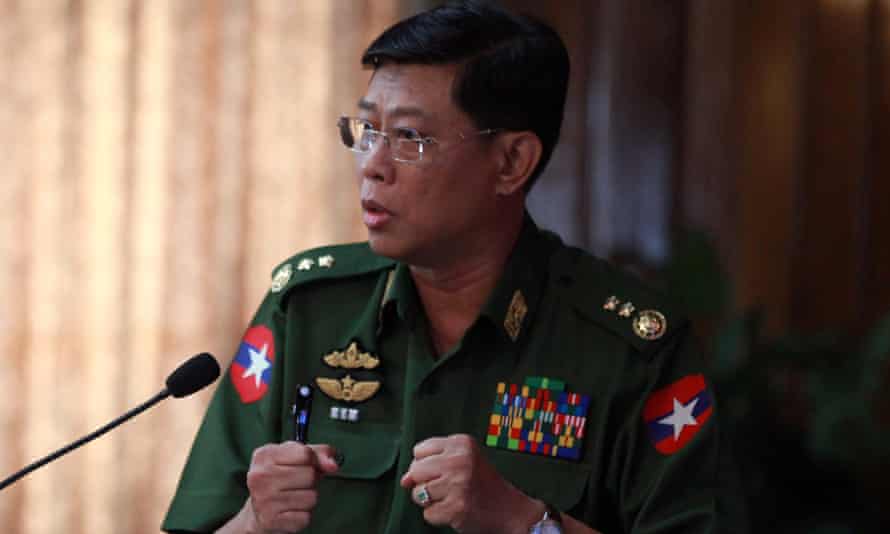
Mya Tun Oo has been appointed defence minister. Photograph: Soe Zeya Tun/Reuters
Mya Htun Oo, 59, joined Myanmar’s defence academy in 1980 and enjoyed a rapid rise through the armed forces, becoming the chief of staff for the army, navy and air force in 2016. Prior to the coup, he had been considered one of the favourites to replace Gen Min Aung Hlaing when he reached mandatory retirement age this year. He is five years younger than Min Aung Hlaing. According to Human Rights Watch, Mya Tun Oo held the military’s third ranking role as the chief of general during the 2017 campaign against the Rohingya.
Foreign minister: U Wunna Maung Lwin
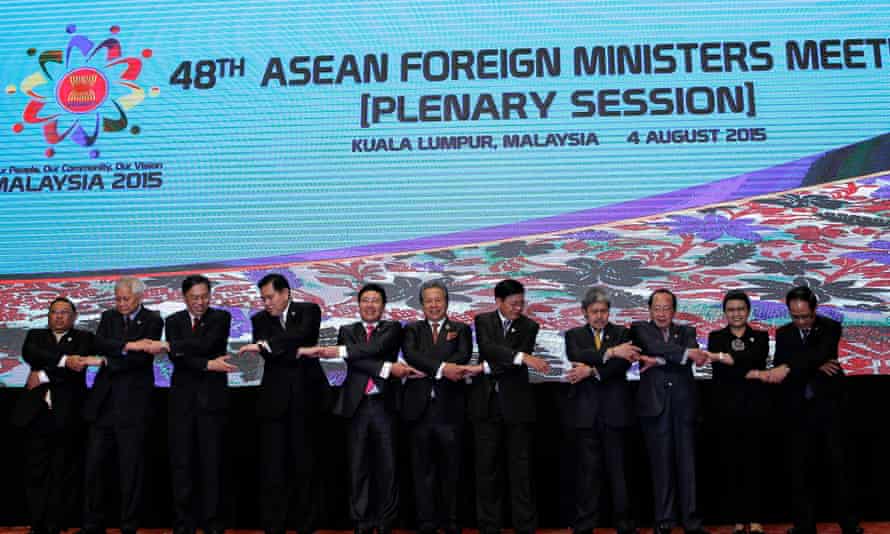
The foreign minister, U Wunna Maung Lwin (far left) attends an Asean session in Kuala Lumpur in 2015. Photograph: Fazry Ismail/EPA
The military has kept U Wunna Maung Lwin, 68, in his post as foreign minister. U Wunna Maung Lwin had a long history with the military, serving for nearly three decades before retiring as a colonel. He has also served as the representative to the UN (2007-2011) and as foreign minister (2011-16). His father, Lt Col Maung Lwin, was minister of foreign affairs from 1969 to 1970.
Planning, finance, industry minister: U Win Shein
U Win Shein has previously held posts as deputy minister for transportation (2011-2012) and finance (2012). In 2013-2014 he was chairman of the Myanmar Investment Commission. His family has a long history in ruling Myanmar. His father, San Shein, was a member of the Burma Socialist Programme party’s central executive committee.
The military has kept U Wunna Maung Lwin, 68, in his post as foreign minister. U Wunna Maung Lwin had a long history with the military, serving for nearly three decades before retiring as a colonel. He has also served as the representative to the UN (2007-2011) and as foreign minister (2011-16). His father, Lt Col Maung Lwin, was minister of foreign affairs from 1969 to 1970.
Planning, finance, industry minister: U Win Shein
U Win Shein has previously held posts as deputy minister for transportation (2011-2012) and finance (2012). In 2013-2014 he was chairman of the Myanmar Investment Commission. His family has a long history in ruling Myanmar. His father, San Shein, was a member of the Burma Socialist Programme party’s central executive committee.
THE GUARDIAN Website
Article Links
OTHER HUMAN RIGHTS PROMOTIONS WEBSITES
-------------------------------------------------------------------------------------
THE GLOBAL WORLD PROMOTIONS
-------------------------------------------------------------------------------------
-------------------------------------------------------------------------------
---------------------------------------------------
------------------------------------------------



































0 comments:
Post a Comment